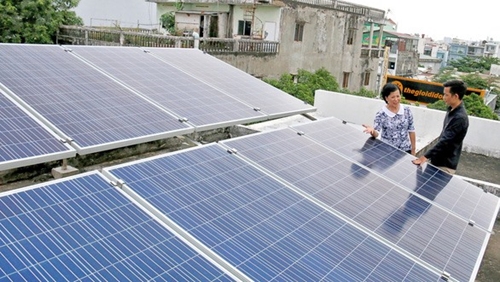The practice follows the Ministry of Trade and Investment’s decree on developing grid-connected solar power projects which came into effect in October 2017.
It encouraged citizens to produce solar power at home to cover their domestic electricity demand and contribute to the national power grid.
The method has proved to be a worthy investment as it helps reduce electricity costs for residents.
    |
 |
|
Solar panels installed on the roof of a house in HCM City. Photo tuoitre.vn |
About 860 families in the city have installed solar panels on their rooftops and registered to sell about 1 million kWh of electricity to the Electricity of Vietnam Group (EVN).
Nguyen Thi Thu Tham from Tan Phu district spent VND 50 million (USD 2,150) installing eight solar panels on her rooftop, which produce 300 kwH of electricity per month.
Ever since they got the panels installed, her family felt more comfortable using electricity-consuming appliances such as air-conditioners, fans and washing machines, Tham said.
“With seven members in our family, our electricity bill used to reach VND 1.5 million (USD 65) per month,” she said. “Now we only pay VND 500,000-700,000 (USD 22-30) per month thanks to the solar panels.”
Nguyen Dinh Hien in Tan Binh district got 12 solar panels installed, which helps him save about VND 1 million on his electricity bill each month. “I plan to get more panels as I still have space on my rooftop,” he said.
Residents are encouraged to sell the solar power they produce to the national power grid. However, a payment rate and tax rate have not been worked out by the city.
Nguyen Van Ly, Deputy Director of the HCM City Power Corporation, said, “We have not been able to figure out a payment mechanism between the seller and the buyer.
“We keep records of the amount of power that citizens have contributed and we have a fixed electricity retail price. But we haven’t been able to pay them due to some problems with the tax procedures.”
The company is waiting for instructions from the Ministries of Industry and Trade, and Finance on these matters, he added.
Nguyen Tan Hung, the company’s community relations manager, said the company will work to provide a free two-way electric meter for each household that installed a solar power system. This piece of equipment helps record the amount of electricity they transfer to the national power grid.
“We came up with this policy as an incentive to encourage residents, but haven’t been able to install the equipment in all households since there are too many of them all in the city,” he said.
Companies are also taking advantage of this opportunity to offer solar panel installation services with good incentives.
SolarBK, a Vietnamese provider of renewable energy solutions, is collaborating with the BIDV Insurance Corporation (BIC) to offer power output warranty packages for systems installed by July 31, 2019.
It also partners with the Bank for Investment and Development of Vietnam (BIDV) to offer clients preferential packages for 12-36 month loans, with a loan approval rate of 70 percent.
Research from SolarBK shows that due to the development of technology, a solar power system’s performance can be improved by 6.4 percent without having to increase the number of panels.
Considering the technological advancements that will take place in the coming years, even households with limited rooftop space can have a solar power system installed, a representative from the company said.
Source: VNA